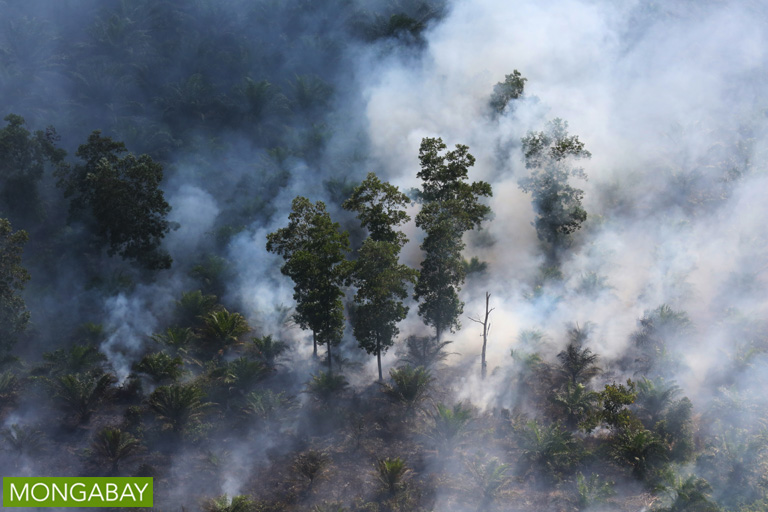- A new investigation reveals intimate connections between Asia Pulp & Paper, which is Indonesia’s largest paper producer, and 25 of the plantation companies that supply it with pulpwood.
- The firm has always claimed the suppliers are “independent” entities, separate from Asia Pulp & Paper itself. But the investigation suggests that that they are all part of the same conglomerate.
- The supplier companies are often linked to deforestation, haze-causing fires, and conflict with indigenous communities.
An investigation by The Associated Press has uncovered ownership ties between one of the world’s largest paper producers and more than two dozen tree-plantation companies linked to devastating fires and deforestation in Indonesia.
The news agency used hundreds of pages of corporate records to determine that Asia Pulp & Paper (APP) – an arm of the family-run Sinar Mas conglomerate – has “extensive behind-the-scenes ties and significant influence” over a vast network of suppliers that the paper giant had consistently asserted were independent entities.
Twenty-five of APP’s suppliers were found to be owned by 10 individuals, including six current and two former employees of the conglomerate, several of whom work in its finance department.
The suppliers are controlled, according to an article published by the news agency last week, “through layers of shareholding companies that are almost always based in Sinarmas offices and in most cases have Sinarmas employees, ranging from top executives to humble IT workers and accountants, as their directors and commissioners” – some of whom are descendants of 96-year-old Sinar Mas founder Eka Tjipta Wijaja, whose billionaire family still owns the conglomerate.
The Associated Press even found an internal Sinar Mas document describing its own “significant influence” over an unspecified number of its suppliers through long-term purchasing agreements, loans, asset and service transfers, and trades lacking financial justification.
“The full picture of what benefits Sinarmas obtains by obscuring the true extent of its ties to the plantation companies is unclear,” the news agency wrote, in possible allusion to whether the ruse serves to minimize the firm’s tax burden in Indonesia. Such questions have been raised about APP’s main competitor in the paper business, APRIL, whose own corporate structure was exposed last month as part of the Paradise Papers leak.
“But the perception that these suppliers are independent has been a crucial public relations weapon in the past few years, allowing it to minimize responsibility whenever controversy strikes.”
The findings, according to the report, “suggest Sinarmas has a greater degree of responsibility for Indonesia’s annual dry-season fires than previously known.”

The Associated Press’ report calls into question whether APP is adhering to a high-profile sustainability pledge it made in 2013, when it promised to purge its operations of deforestation and land grabbing.
APP continues to insist upon its dedication to the policy. In a statement issued on Friday, the firm denied what it characterized as “false and malicious” allegations that it had “deliberately used various ownership structures for the purposes of systematically avoiding our sustainability commitments.”
While the news agency did not publish the full list of suppliers it says are controlled by Sinar Mas, it did name two of the suppliers, which it examined in some depth: PT Bangun Rimba Sejahtera (BRS) and PT Muara Sungai Landak (MSL).
The first of these, BRS, is involved in a conflict with communities on the island of Bangka, just off Sumatra’s eastern coast, where it is trying to set up a series of plantations despite widespread opposition from residents. (The Associated Press examined the BRS case in a separate article published last week.)
In its statement, APP said it would not approve sourcing from BRS unless the supplier had obtained the “free, prior and informed consent” of local communities. The paper giant previously told the news agency it had “no affiliation” with BRS.
In reality, however, BRS has been “a Sinarmas creature for most of the past decade.” The news agency wrote:
In 2007 it was owned by Margaretha Widjaya, who was deputy CEO of Sinarmas Forestry from 2002 to 2008 and is a granddaughter of the Sinarmas patriarch.
Corporate filings show that BRS was owned for years by two layers of holding companies that recorded their addresses as Sinarmas offices and whose top personnel and shareholders included Sinarmas executives.
On paper, its ties to Sinarmas vanished in 2013, when it secured its license to the state land on Bangka. One of its two current owners identifies himself in corporate filings with a single name and the second owner, a former forestry ministry inspector-general, did not answer calls.
But BRS later employed a corporate social responsibility officer who as recently as last year identified his employer as part of Sinarmas on a social media profile. He has since removed all references to the conglomerate.

The other supplier, Muara Sungai Landak, operates in West Kalimantan, a province in the Indonesian part of Borneo island, where it has been linked to extensive deforestation.
In its statement, APP dismissed any points raised about MSL, on the grounds that the company “is not a supplier to APP and has no business relations with APP.”
But The Associated Press found that the company “is owned through layers of holding companies by a 36-year-old IT employee of Sinarmas Forestry and a 43-year-old auditor at Sinarmas Forestry.”
Global Forest Watch shows 516 hectares of primary-forest loss in the MSL concession in 2014, the latest year for which there is data. APP promised to stop deforesting in 2013.
The deforestation may or may not have been caused by the company; APP responded to allegations of deforestation in a nearby concession, one owned by its supplier Bumi Mekar Hijau, by blaming it on encroachment by local communities.
Banner image: Drainage canals bisect a peat swamp planted with pulpwood trees on Indonesia’s main western island of Sumatra. Photo by Rhett A. Butler/Mongabay.







